The Best Suncreens For Your Face, According to Dermatologists

Our editors independently select the products we recommend. We may earn a commission on items bought through our links.
Fact: The sun’s UVA and UVB rays damage the DNA of skin cells, leading to premature skin aging and even cancer. Also a fact: A multi-layered approach to sun protection, which includes using adequate sunscreen, is the only way to ensure you’re protected against these skin-damaging rays. Considering that one in five Americans will develop skin cancer by the age of 70, this may seem like an obvious concept, but it wasn’t long ago that folks were freely sunbathing sans SPF or, even worse, hopping into tanning beds to fake that just-got-back-from-vacation bronze.
Today's Top Deals
Thankfully, sun protection has been taken much more seriously in recent years, leading to a boom in the number of sunscreen options available — especially products formulated specifically for the face, arguably the body part most exposed to the sun.
Today’s facial sunscreens are a lot more advanced than those of the past, whether they’re tailored to suit specific skin types, packed with additional beneficial skincare ingredients, or formulated to simultaneously combat existing sun damage.
All that’s to say, there are a lot of options to sort through, and when the average bottle can cost you anywhere from $10 to $70, knowing which ones are most effective and the right fit for your specific needs can take a lot of trial and error. A good place to start is understanding what qualities are non-negotiables in terms of efficacy and exploring what type of formula you prefer.
What the Experts Say
To help narrow down the list of the best facial sunscreens available now, SPY tapped a handful of experts within the dermatology space to share their insights: board-certified dermatologist Dr. Luke Maxfield; board-certified dermatologist and Skintensive co-founder Dr. Anar Mikailov; double board-certified cosmetic and laser dermatologist and Mohs surgeon Dr. Tiffany J. Libby; and board-certified dermatologist and Epoch Dermatology founder Dr. Nicole Lee.
The general consensus among all the experts is that you should be using, at minimum, SPF 30, which blocks 97% of UVB rays, though SPF 50 is recommended, which blocks 98%. After 50, you don’t need to be as concerned about numbers. “I find SPF 100, which only blocks 99% of rays, unnecessary, and oftentimes it’s been misleading to my patients who think it means the sunscreen blocks out 100% of UVB rays,” says Dr Libby. “It’s important to remember that no sunscreen is 100% effective at blocking UV radiation, so a multi-layered approach to sun protection — minimizing exposure at peak hours of sun, using protective hats and sunglasses, and adequate reapplication — is best.”
SPF only measures against UVB protection, so all experts also stress the importance of using a formula with broad-spectrum coverage, which indicates that it protects against both UVA and UVB radiation. And if you’ll be encountering water or sweat, opting for a water-resistant formula is also important, per The American Academy of Dermatology.
Overarching must-have qualities aside, you’ll want to find a sunscreen that suits your specific skin needs and is comfortable to wear (you know, to ensure you’ll actually wear it). “Sunscreen, perhaps more than any other step in skincare, is highly personalized,” adds Dr. Maxfield. “It needs to blend with your skin tone, layer in with your other skincare steps, and feel good on your skin. Simply, sunscreen doesn’t work if a person doesn’t wear it.”
This means deciding whether you prefer a mineral or chemical formula (more on that, below) and figuring out the right texture and feel. Dr. Mikailov recommends considering the product’s comedogenicity — how likely it is to clog pores — especially if you have oily or acne-prone skin. “In this case, look for SPF lotions or serums rather than a cream, as cream-based sunscreens are usually thicker and are more likely to trigger a breakout,” he says. Additional ingredients are also important to consider; if your skin is sensitive, you may want to avoid anything with added fragrance, notes Dr. Lee.
Do you need to shell out for a quality product? The experts wouldn’t necessarily equate a higher price point with being more effective. Some brands offer better coverage and ingredients than others, and this does include some of the more wallet-friendly options. “Sunscreen doesn’t have to be expensive to be great,” says Dr. Maxfield. These days, it seems that many quality sunscreens that are effective, blendable, and comfortable can range from $30-$60 for just a few ounces — however, there are amazing finds out there for less (think $10-15).”
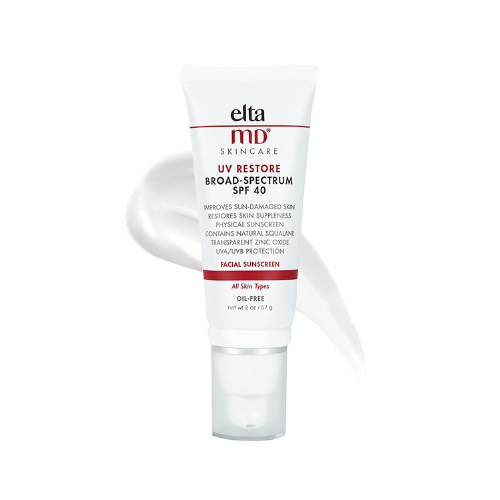
BEST OVERALL
EltaMD UV Restore Broad-Spectrum SPF 40
Buy Now On Amazon
Buy at dermstore
When it comes to effective, quality sunscreen, some brands out there just get it right, like EltaMD. In fact, three of the four dermatologists SPY spoke with had at least one EltaMD product on their list of recommendations (so expect to see the brand appear more than once on this list). UV Restore ranks best overall because it checks all the boxes and then some.
For starters, it protects against UVA and UVB rays with broad-spectrum SPF 40 protection while shielding the skin from blue light, and the zinc-oxide-powered mineral formula dries miraculously clear. “If a person is uncertain where to start when purchasing sunscreen, this a dermatologist favorite,” muses Dr. Maxfield. “Both its tinted and non-tinted forms blend very well, especially for a mineral formula.”
But what makes this formula stand out is how hydrating it is, he adds, thanks to added squalane, an incredibly lightweight moisturizer. What’s more, it’s packed with antioxidant ingredients like ginger root extract and vitamins C and E to help minimize the appearance of existing sun damage.
It leans towards the pricier end of the scale, but this is one trustworthy formula worth the splurge, given its many benefits.
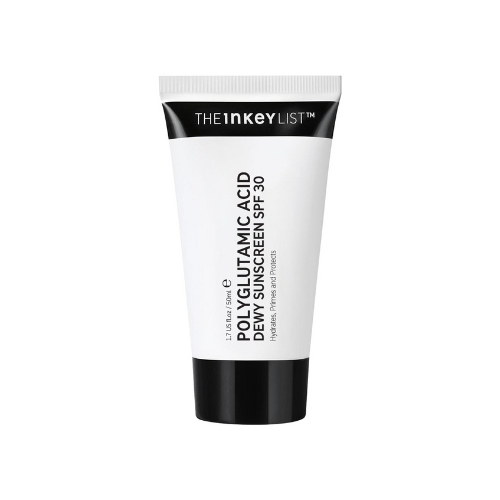
BEST VALUE
The INKEY List Polyglutamic Acid Dewy Sunscreen, SPF 30
Buy Now On Amazon
As Dr. Maxfield mentions above, there are plenty of effective, quality sunscreens on the market that won’t break the bank. Of the more affordable options out there, this INKEY List SPF is one of his top picks due to its protective and hydrating benefits. “It’s the perfect example of a product that gives you a lot at a very budget-friendly price,” he says. “It satisfies the SPF requirement and protects against UVA and UVB rays, and combines polyglutamic acid, glycerin, and squalane for top-tier hydration that blends into the skin seamlessly.” No white cast here.
And don’t be turned off by the word “dewy” — the non-greasy, chemical filter formula really just acts as a facial moisturizer and sun protection in one. “This helpful hack simplifies a skincare routine, saving money, improving consistency, and ultimately leading to healthier skin,” Dr. Maxfield adds.
And, considering it rings in at under 20 dollars, you get plenty of bang for your buck.
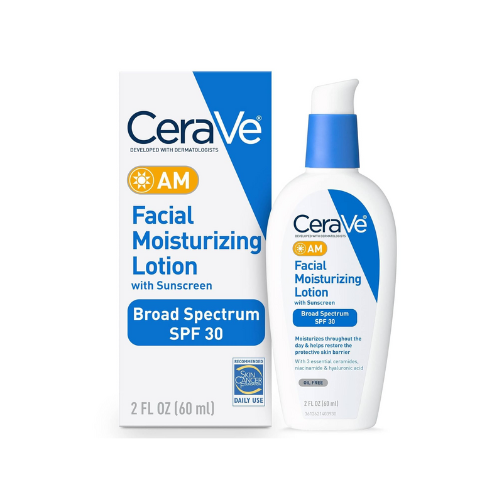
BEST FOR DRY SKIN
CeraVe Facial Moisturizing Lotion
Buy Now On Amazon
Buy at target
Sunscreen is essential regardless of skin type, but those with dry skin will find that too much sun will result in an even drier, flakier complexion. Enter this humble drugstore moisturizer-SPF hybrid, another rec from Dr. Maxfield.
“It provides the broad-spectrum SPF 30 sun protection a person needs, along with the moisturizing benefits that CeraVe is known for,” he says. It contains a combination of chemical and mineral sunscreen ingredients for a formula that spreads evenly sans white cast, but its skin barrier-healing prowess is where this product really shines, something that those with particularly parched skin will benefit from. Thanks to a combination of three essential ceramides, hyaluronic acid, and soothing niacinamide quench the skin and restore your moisture barrier — all without feeling heavy or clogging your pores.
Also, drugstore brands mean drugstore prices, making this one a true no-brainer.
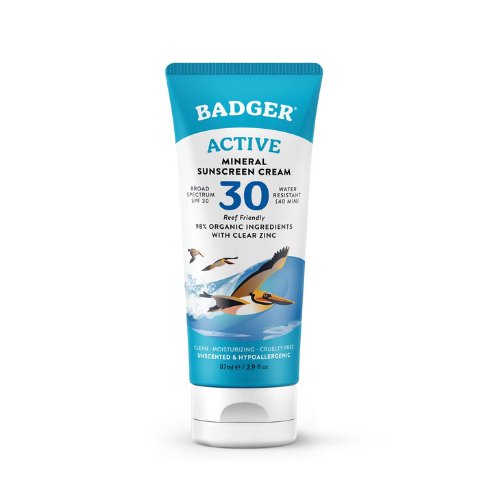
FOR SENSITIVE SKIN
Badger Active Mineral Sunscreen Cream, SPF 30
Buy Now On Amazon
There’s a lot to love about this water-resistant mineral SPF from mission-driven, B-corp-certified brand Badger: It’s made with solar-powered energy, cruelty-free, reef-friendly, and contains 98% organic ingredients. More importantly, the hypoallergenic, gluten-free, unscented formula is super gentle, containing only five ingredients — a boon for those with sensitive skin.
Besides being irritant-free, it’s brimming with other beneficial ingredients. “This has seabuckthorn extract, a berry with tons of antioxidant activity and anti-inflammatory benefits that help soothe and calm skin that’s been under the sun,” says Dr. Mikailov. The creamy consistency leans on the thicker side, but it’s an incredibly nourishing formula.
You might expect to pay a pretty penny for such a clean, sustainably-minded sunscreen, but it’ll run you less than $20. A steal!
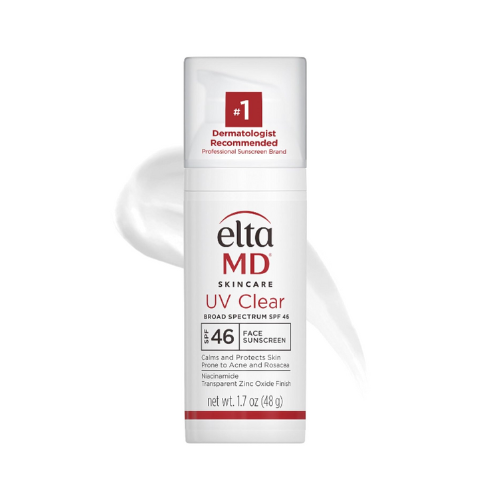
FOR OILY SKIN
EltaMD UV Clear Broad-Spectrum SPF 46
Buy Now On Amazon
There are two features oily and acne-prone skin types should look for in a sunscreen: It should be oil-free, ensuring it won’t clog pores, and it should be hydrating, because oily skin needs moisture, too. Enter another formula from EltaMD, the UV Clear, a favorite of Dr. Lee and Dr. Libby.
The oil-free formula provides ample broad-spectrum SPF 46 protection thanks to a blend of mineral and chemical filters, while skin-loving ingredients like hyaluronic acid, lactic acid, and vitamin E keep the skin hydrated and healthy. More importantly, it’s super lightweight, so it never feels heavy or greasy on the skin. “I consider this one great for both my acne-prone skin and tactile-averse patients who don’t like the feeling of a lotion,” says Dr. Lee.
But what makes this one stand out is its ability to calm the skin. As Dr. Libby points out, the niacinamide in the formula can actually help soothe aggravated, inflamed skin — even during breakouts — and it contains no ingredients that will irritate sensitive skin. The fact that you can trust this formula to not wreak havoc on your skin alone makes this SPF worth the steep-ish price tag.
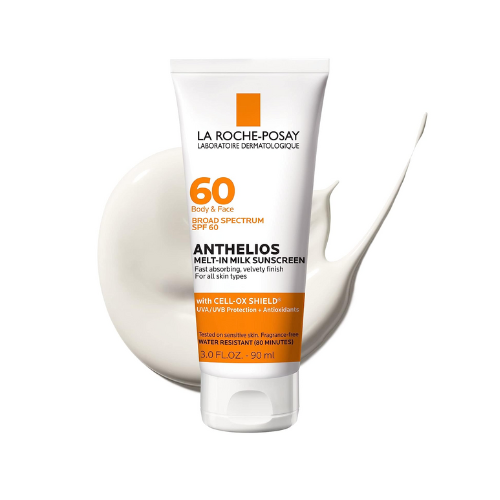
FOR FACE & BODY
La Roche-Posay Anthelios Melt-In Milk Body & Face Sunscreen, SPF 60
Buy Now On Amazon
As Dr. Maxfield mentions above, you can certainly use a body sunscreen on your face, but it likely won’t boast the most desirable consistency. Enter this multi-tasking body and face sunscreen from La Roche-Posay, a favorite from Dr. Libby.
“It absorbs and rubs in beautifully, leaves no white cast, and provides broad-spectrum UVA and UVB protection while also being water resistant up to 80 minutes,” she says.
As the name suggests, it essentially melts into your skin, leaving the complexion hydrated with a velvety, non-greasy finish. What’s more, it’s packed with antioxidants, including the brand’s iconic skin-soothing, selenium-rich thermal spring water — certainly worthy of its mid-range price tag.
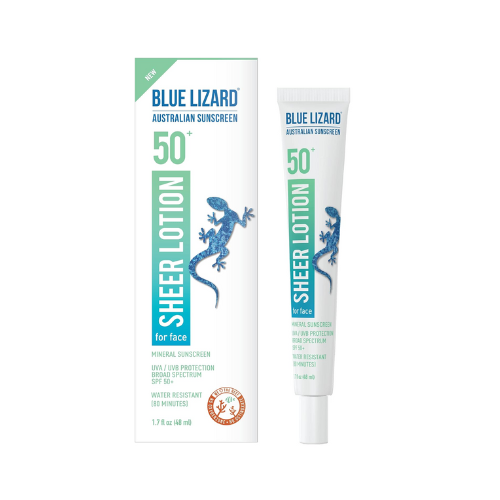
WATER RESISTANT
Blue Lizard Sheer Mineral Sunscreen Lotion for Face, SPF 50+
Buy Now On Amazon
Whether you’re going for a swim or a light jog, choosing a water-resistant sunscreen is absolutely crucial to ensure you stay protected; however, these formulas have a reputation for feeling sticky or heavy, which can deter some. This formula from Aussie brand Blue Lizard is anything but; it’s light and hydrating, which makes it a favorite of Dr. Mikailov.
With broad-spectrum SPF 50+ protection, 80 minutes of water resistance, and protection against blue light, this zinc oxide formula is packed with good-for-you ingredients (like antioxidants and shea butter) that leave skin soft and nourished. “It’s sheer, easy to apply, and lasts through sweat or fun in the water, plus it’s fantastic for people with sensitive skin that needs additional moisture,” he says.
Moreover, it’s reef-safe, making it a reliable option for beach days. Did we mention it’s affordable, too?
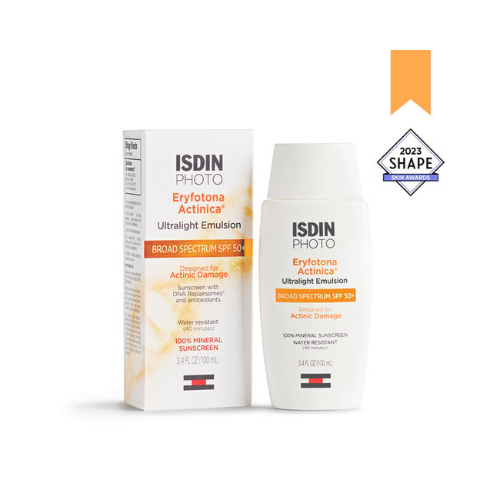
BEST FOR SUN DAMAGE
ISDIN Eryfotona Actinica
Buy Now
ISDIN is another dermatologist-recommended brand, and the award-winning Eryfotona Actinica is one of Dr. Libby’s favorites. Let’s start with the basics: The mineral formula packs broad-spectrum SPF 50+ for adequate sun protection against both UVA and UVB rays, it’s water resistant, and it has a comfortable, non-greasy feel. “It’s lightweight and absorbs elegantly into the skin,” says Dr. Libby.
But what sets this formula apart from others is its reparative properties. “It uses innovative DNA repairsomes technology to further counteract the damage done to the skin by UV radiation by repairing existing damage,” she says.
All that’s to say, it comes with a pretty hefty price tag for sunscreen, but if you’re concerned with undoing some previous sun damage and appreciate a luxurious hand-feel, it might be an investment worth making.
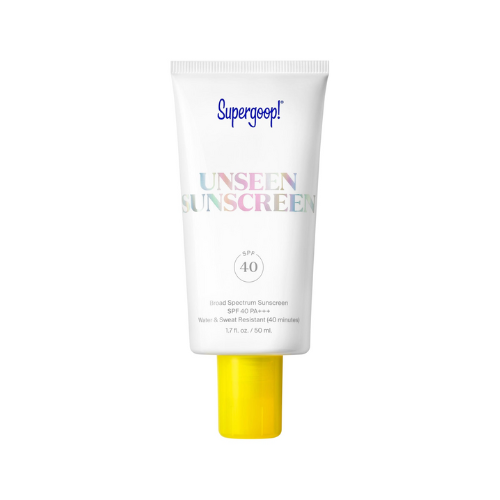
FOR DARK SKIN TONES
Supergoop! Unseen Sunscreen, SPF 40
Buy AT SEPHORA
Buy AT ULTA
Some sunscreens, especially mineral formulas, are known for leaving behind a chalky white cast, so products with chemical filters tend to be a better option (and less visible) on darker skin tones. This fan-favorite formula from Supergoop! is wildly popular for this reason — it’s literally invisible. “In terms of blendability, this formula had earned a reputation for being seamless with nearly any skin tone,” says Dr. Maxfield.
Seamlessness aside, it’s simply an all-around reliable, quality formula with broad-spectrum SPF 40 protection, water resistance for up to 40 minutes, and a weightless, non-greasy feel. “It’s a favorite amongst my favorites as an oil-free, lightweight, and cosmetically elegant sunscreen,” adds Dr. Libby.
It’s more expensive than the average facial sunscreen, but if chalkiness keeps you from wearing adequate sun protection, this is the product for you.

BEST STICK
EltaMD UV Stick Broad-Spectrum SPF 50
Buy Now On Amazon
Quality, effective sunscreens don’t always need to be in a cream, lotion, or serum form — sunscreen sticks are beneficial for a lot of reasons, especially when you’re on the go (yes, it’s TSA-friendly) so long as you’re adamant about applying a liberal, even amount of product.
Dr. Lee loves this formula from EltaMD and considers it great for reapplying consistently throughout the day, “especially when you’re on the slopes and for the lips.” The all-mineral water-resistant formula boasts broad-spectrum SPF 50+ protection, blue light protection, and skin-loving antioxidants. More importantly, it absorbs quickly and never leaves behind a pesky white cast.
The price-per-ounce is a little steep, but considering the on-the-go, travel-friendly ease of it all, it’s a worthy investment.
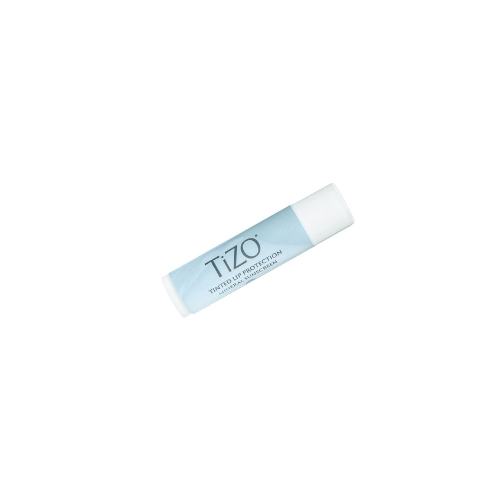
BEST FOR LIPS
TiZO Chapstick Sunscreen
Buy Now
When it comes to protecting your face from sun damage, your lips need some love, too. “The lips are prone to UV damage (collagen degradation, fine lines, wrinkles, and skin cancer) just like the rest of the skin,” says Dr. Mikailov. That’s where this nifty chapstick comes in, which boasts broad-spectrum protection and a hydrating, sensitive-skin-friendly formula that’s free of dyes, preservatives, phthalates, and parabens.
Don’t be put off by the fact that it’s tinted — the tan formula simply ensures that the mineral formula won’t leave a white cast on your lips. It may cost double the price of your average drugstore chapstick, but for something that will protect you from skin damage and even cancer, it’s worth it. Plus, the photostable packaging ensures it won’t degrade in the sun (deeming it ineffective) should you accidentally leave it out, and it also has the most delicious (yet subtle) kiwi-lime-ginger flavor.
Frequently Asked Questions About Facial Sunscreens
Should I use a mineral or chemical sunscreen?
First, it’s important to understand the difference between the two. Mineral sunscreens — sometimes referred to as physical sunscreens due to how they sit on top of the skin — use inorganic compounds like zinc oxide and titanium dioxide to protect against UV radiation, explains Dr. Libby. Chemical sunscreens absorb into the skin rather than sit on top, absorbing UV rays and releasing them from the body through a chemical reaction. These formulas include actives like oxybenzone, octinoxate, octisalate, avobenzone, homosalate, and octocrylene.
But is one better than the other? Not necessarily. “The answer to this is neither or both,” says Dr. Maxfield. “People may have a personal preference for one or the other, but due to strict regulation in the US, the efficacy is relatively consistent — both effectively protect the skin by reflecting and/or absorbing the energy from UV rays so that it doesn’t reach our skin. Mineral filters are more physically inert, therefore, many people feel more comfortable using them, but they’re much less cosmetically elegant and often struggle to blend with skin tones,” while chemical options that absorb are less likely to leave behind a chalky residue. As Dr. Mikailov points out, mineral sunscreens may also be a less irritating choice for sensitive skin, with Dr. Lee adding that they’re also safer for pregnant mothers and children.
Speaking of safety, this is where much of the debate stems from. “Chemical filters have undergone extensive testing on safety, which should be reassuring; however, many people are deterred because they interpret the studies as that although problems are ‘not probable,’ they are possible,” says Dr. Mikailov.
At the end of the day? “The best sunscreen is one that you enjoy using and will use consistently and appropriately by applying the correct amount to achieve adequate protection,” says Dr. Libby.
Can I use body sunscreen on my face?
Technically, you can, notes Dr. Maxfield, but you might not want to. “Body sunscreens often lack the refinement of texture and can be off-putting, which would probably stop someone from using them on their face unless they’re in a pinch,” he says. Similarly, you can use facial sunscreen on your body, “but the volume to cover the body and the respective cost are prohibitive.”
It’s also important to note that while spray formulas — often marketed for both face and body — may seem like convenient, easy-to-apply options, they’re generally not recommended by dermatologists. “It’s hard to quantify how much of the sunscreen you’re actually getting onto the face, as much of it is aerosolized, so it’s likely inadequate application,” says Dr. Libby. “Approximately 30-60% of the bottle is made of aerosolized propellants or faces, which are also not great to breathe. If you’re going to use a spray, hold it about 3-4 inches from the face, hold your breath, apply evenly, and rub in.”
How much sunscreen should I apply to my face?
Both Dr. Libby and Dr. Maxfield recommend using 2 miligrams of sunscreen per square centimeter of skin — something hard for the average person to visualize. “The easiest way to remember is to apply two finger lengths worth, which equates to about a nickel-sized amount or a half teaspoon for both the face and neck,” says Dr. Libby. And don’t forget to get your ears, too!
But do I really need to reapply it every two hours?
Yup, at a minimum, if you’ll be outside. According to Dr. Maxfield, every two hours is a good rule of thumb for outdoors, but it’ll vary by product. “Every product has its own recommendations, and if there’s water exposure or sweat, a person needs to use a water-resistant sunscreen and also reapply it more frequently, as the packaging suggests.” Environmental factors such as humidity, elevation, and proximity to the equator can also affect how frequently you’ll need to reapply, says Dr. Lee, adding that a higher SPF number does not replace the need for reapplication: “It’s still important to reapply every two hours, as the sun, sweat, wind, and water will break it down.”
Proceed to Check Out
The Best Face Moisturizers for Men, According to Dermatologists
The 11 Best Mineral Sunscreens With Zinc, According to a Dermatologist
More Top Deals from SPY
Best of SPY
